Oct 2014
Strange seal pup season continues in West Seattle
Oct/26/14 09:27 AM
The 2014 harbor seal pupping season in West Seattle has proven to be a rocky one. Seal Sitters Marine Mammal Stranding Network’s (SSMMSN) first responders have totaled up 85 responses since lanugo pup Luigi was found on June 9th in the tideline on the busiest stretch of Alki Beach - across from the Bathhouse. Those responses included 24 positively identified pups and 23 dead ones (5 of whom died on the beach or in transport to PAWS Wildlife Center). This almost 50% mortality is the highest rate since volunteer David Hutchinson began keeping detailed response stats in 2011.
*Please note: In the wild harbor seal population, 50% mortality is considered normal for seal pups in their first year. In West Seattle, however, we have not recorded such a high rate in prior years.
A total of 112 responses have been made by SSMMSN first responders to date this year.
SSMMSN AVERAGE ANNUAL STATISTICS :
• 200 responses
• 70% of responses during pupping season (start date is the arrival of first newborn or weaned pup in West Seattle)
• 90% of all responses are to harbor seal pups
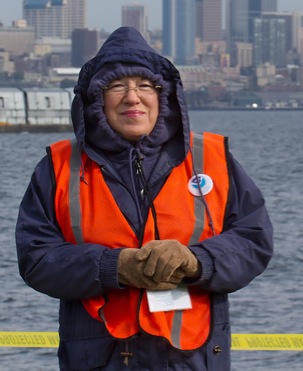 We haven’t had a pup reported onshore this past week, but a few have been sighted in Elliott Bay. The tribal gill nets, stretched out at great lengths across the Bay and Duwamish River, are always a safety concern for unwitting pups who can become entangled and drown. Seal Sitters rescued and freed one such pup a few years ago.
We haven’t had a pup reported onshore this past week, but a few have been sighted in Elliott Bay. The tribal gill nets, stretched out at great lengths across the Bay and Duwamish River, are always a safety concern for unwitting pups who can become entangled and drown. Seal Sitters rescued and freed one such pup a few years ago.
During turbulent weather, harbor seal pups often ride out storms by bottom resting - sleeping on the sea floor and rising every 20-30 minutes to take a breath. Once the weather calms down, pups often need to seek additional rest and, especially, warmth on shore. These thinner, weaned pups have no thick coat of blubber for insulation and energy.
Now that this most recent wind and rain storm has moved through the area, Seal Sitters volunteers (like JoDean at left) are standing by anxiously to help out -rain or shine - should a pup need protection on the beach.
*Please note: In the wild harbor seal population, 50% mortality is considered normal for seal pups in their first year. In West Seattle, however, we have not recorded such a high rate in prior years.
A total of 112 responses have been made by SSMMSN first responders to date this year.
SSMMSN AVERAGE ANNUAL STATISTICS :
• 200 responses
• 70% of responses during pupping season (start date is the arrival of first newborn or weaned pup in West Seattle)
• 90% of all responses are to harbor seal pups

During turbulent weather, harbor seal pups often ride out storms by bottom resting - sleeping on the sea floor and rising every 20-30 minutes to take a breath. Once the weather calms down, pups often need to seek additional rest and, especially, warmth on shore. These thinner, weaned pups have no thick coat of blubber for insulation and energy.
Now that this most recent wind and rain storm has moved through the area, Seal Sitters volunteers (like JoDean at left) are standing by anxiously to help out -rain or shine - should a pup need protection on the beach.
Weekly pupdate: two seal pups onshore
Oct/18/14 06:34 PM
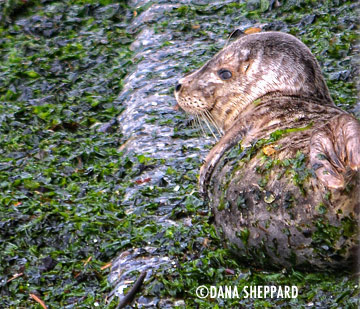
On Tuesday at Jack Block Park, seal pup Drifter was spotted by one of our first responders during a routine check of the beaches. Eilene noticed a small, white torpedo shape alongside some driftwood at the far end of the public area. Sure enough, a seal pup was zonked out there, oblivious and at risk on a beach notorious for off-leash dogs. The beach was quickly closed off and Seal Sitters’ scheduler for the day was contacted. Volunteers looked after Drifter in 2-hour shifts until he/she returned to Elliott Bay around 5pm.
Seal pup loss a reminder how vulnerable weaned pups are
Oct/10/14 07:47 PM
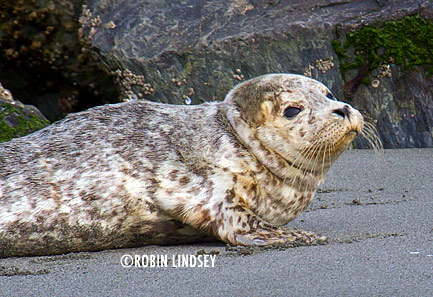
“Beautiful” indeed was Pumpkin, who had unexpectedly come ashore during daylight hours on Wednesday, after having already spent a number of hours resting overnight.
Thin but alert, she slept throughout the day and crept higher up on the sand as the tide slowly moved in. Finally, in the afternoon a series of waves swept over Pumpkin and she swam off into the Sound, returning a short time later. She rested until early evening before swimming off once again and Seal Sitters volunteers headed home, but responders continued to monitor the area. Checking the closed beach at 8:45pm, she was still gone. However, Pumpkin was back again before 6:30am Thursday and was lethargic throughout the morning.
This increased need to be ashore was not a good sign for a thin, weaned pup - all of whom are struggling mightily this time of year. With dwindling fat stores for energy and warmth, each day is a battle between life and death. Sadly, around 1pm yesterday, this tiny white pup lost that battle and died at the water’s edge, trying to return to Puget Sound.
Heartfelt thanks to all of the volunteers who invested many hours to give Pumpkin the best chance we could to rest, warm up and try to gain strength, free from harassment and stress. And special thanks to the first responders who monitored the beach at Duwamish Head each night, closing the beach to protect her and removing the tape barrier at dawn when she was gone.
The passing of every seal pup - and Seal Sitters MMSN has had more than our quota of death this pupping season - is a constant reminder how terribly vulnerable these small marine mammals are, with 50% mortality their first year. Please, Share the Shore with wildlife - you might very well save a life.
Long days and lots of seal pups stretch volunteers thin
Oct/09/14 10:09 AM
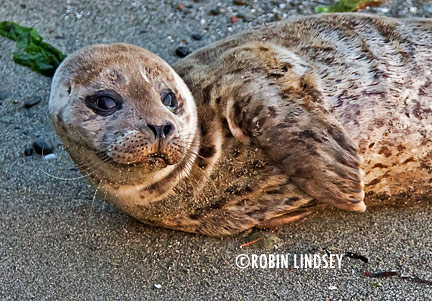
Four of those pups were terribly thin and desperately needed sanctuary on shore. Volunteers worked in shifts from early morning until dark protecting them. Seal pup Autumn at Lincoln Park and seal pup Mahina (Hawaiian for “moon”) near Cormorant Cove returned to the water overnight.
Seal pup Surfer (photo above) tried to rest in a spot just below rowdy ferry commuters who talked loudly and took photos. Our responder kept watch over Surfer, intercepting 4 beach walkers with off-leash dogs. Each person was strolling along the sand with mobile device earbuds firmly implanted, oblivious to their surroundings and their dogs running far ahead of them. Barely able to get their attention before it was too late, several dogs came within 15-20 feet of the pup. The last, a large white dog, came even closer before the owner restrained the excited animal - and Surfer was scared back into the water, wasting precious calories.

Seal pup Seacil still hangs out on the rocky shoreline along Elliott Bay each day and night, in between foraging trips for tiny bait fish.
Over the past week, Seal Sitters volunteers have educated many, many hundreds of people about harbor seal behavior and our fragile marine environment thanks to these tiny ambassadors who grace us with their presence.
Seal pup entertains as volunteers educate the public
Oct/06/14 10:05 PM
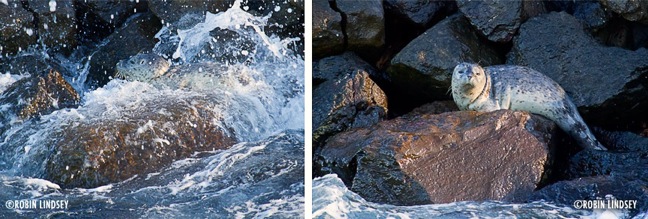 A seal pup nicknamed Seacil has been charming passersby and volunteers for the past few days along the shore of Elliott Bay. The pup periodically snacks on what appears to be a bounty of tiny fish just offshore and then returns to rest on craggy rocks that comprise the seawall - usually just after high tide. Trying to snooze at the water’s edge is not always uneventful, however. Shown here, Seacil has hauled out at high tide, only to be engulfed in a series of waves from a freighter headed out into Puget Sound from the Port of Seattle. Undaunted, the pup held fast and then nonchalantly settled in for a very long nap. It’s hard to imagine complaining about a lumpy mattress when you watch pups trying to find a comfy spot to sleep on jagged rocks!
A seal pup nicknamed Seacil has been charming passersby and volunteers for the past few days along the shore of Elliott Bay. The pup periodically snacks on what appears to be a bounty of tiny fish just offshore and then returns to rest on craggy rocks that comprise the seawall - usually just after high tide. Trying to snooze at the water’s edge is not always uneventful, however. Shown here, Seacil has hauled out at high tide, only to be engulfed in a series of waves from a freighter headed out into Puget Sound from the Port of Seattle. Undaunted, the pup held fast and then nonchalantly settled in for a very long nap. It’s hard to imagine complaining about a lumpy mattress when you watch pups trying to find a comfy spot to sleep on jagged rocks!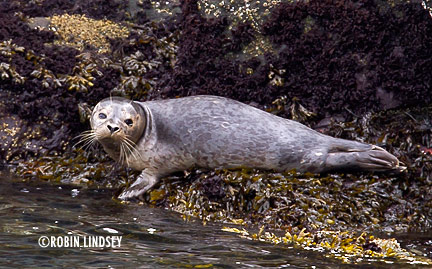
On Saturday morning, a second pup named Kazoo (at left) rested briefly on the same stretch of rocks along with Seacil. It was our first sighting of both pups.
Another highlight to the week was continuing to ensure that our little ghost of a pup, Pumpkin, is safe at night. She comes ashore after dark each evening, returning before first light. We have only seen the tiny white pup a few times, but always see her tracks in the sand very early each morning. Access to the small beach is closed off each night at dark and the tape is removed the next morning, after checking to make sure she has returned to the Sound.
Adult female seal chooses dangerous location to rest
Oct/05/14 09:08 AM
As of Friday, a struggling adult female harbor seal continued to choose the ever-perilous Don Armeni boat launch as her resting place. Rising tempers from a few unenlightened and hostile fishermen added to the stress of Seal Sitters MMSN volunteers who attempted to keep her safe under the guidelines of the Marine Mammal Protection Act - and keep the peace with boaters at the sometimes busy ramp. We want to emphasize that the vast majority of fishermen who used Don Armeni during the days that Jellybean sought refuge there were generous and accommodating to her presence. However, it only takes an irate few to turn a difficult situation into a dangerous one for a compromised seal.
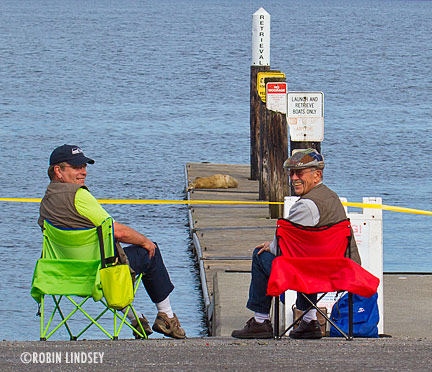 Volunteers like Lars and Ralph (shown at left), allowed the thin, postpartum seal to get some much needed shut-eye on the one closed dock. The opposite dock and lanes were wide open for boaters to launch and retrieve and rarely was there more than a few minute wait to do so.
Volunteers like Lars and Ralph (shown at left), allowed the thin, postpartum seal to get some much needed shut-eye on the one closed dock. The opposite dock and lanes were wide open for boaters to launch and retrieve and rarely was there more than a few minute wait to do so.
Throughout the day on Thursday and Friday morning, we explained to boaters that a capture plan was being put into effect for the ailing seal. It was determined that for the safety of the seal, she would be captured, taken to a quiet location and given a health assessment. If her health was deemed poor, she would be taken to rehab. If her ailment was not serious, she would be given topical antibiotics or other treatment and released at a quieter, much safer location.
On Friday afternoon, a team from WDFW Marine Mammal Investigations along with two marine mammal vets assembled at the launch. Twice, attempts were made, but without success. A difficult logistical challenge at best with her tail half-draped over the edge of the dock, the seal was able to escape from the landing net. The positive outcome of this is that she seems strong enough to avoid capture, meaning she is probably healthy enough not to be a rehab candidate. Secondly, it should make her more wary to use a public boat launch as a resting place and realize that not all people have her best interests at heart. We hope she finds a more secure place in our area where we can help her rest and build up strength.
Seal Sitters volunteers have been monitoring the boat ramp area and have seen her close by. However, with all the boating activity of the sunny weekend and folks hanging out on the docks, she appears to be wise enough to keep a distance. We will continue to keep an eye out for her. Should you see a seal anywhere on shore, please call our dedicated hotline immediately: 206-905-SEAL (7325).
Thanks to all the volunteers who put in long (and sometimes trying) hours and kept Jellybean safe. You are awesome! And many thanks to NOAA’s Northwest MMSN stranding coordinator Kristin Wilkinson and to the capture team: WDFW’s Dyanna Lambourn, Erin D’agnese, Seattle Aquarium veterinarian Lesanna Lahner and veterinarian Jeanne Ross.

Throughout the day on Thursday and Friday morning, we explained to boaters that a capture plan was being put into effect for the ailing seal. It was determined that for the safety of the seal, she would be captured, taken to a quiet location and given a health assessment. If her health was deemed poor, she would be taken to rehab. If her ailment was not serious, she would be given topical antibiotics or other treatment and released at a quieter, much safer location.
On Friday afternoon, a team from WDFW Marine Mammal Investigations along with two marine mammal vets assembled at the launch. Twice, attempts were made, but without success. A difficult logistical challenge at best with her tail half-draped over the edge of the dock, the seal was able to escape from the landing net. The positive outcome of this is that she seems strong enough to avoid capture, meaning she is probably healthy enough not to be a rehab candidate. Secondly, it should make her more wary to use a public boat launch as a resting place and realize that not all people have her best interests at heart. We hope she finds a more secure place in our area where we can help her rest and build up strength.
Seal Sitters volunteers have been monitoring the boat ramp area and have seen her close by. However, with all the boating activity of the sunny weekend and folks hanging out on the docks, she appears to be wise enough to keep a distance. We will continue to keep an eye out for her. Should you see a seal anywhere on shore, please call our dedicated hotline immediately: 206-905-SEAL (7325).
Thanks to all the volunteers who put in long (and sometimes trying) hours and kept Jellybean safe. You are awesome! And many thanks to NOAA’s Northwest MMSN stranding coordinator Kristin Wilkinson and to the capture team: WDFW’s Dyanna Lambourn, Erin D’agnese, Seattle Aquarium veterinarian Lesanna Lahner and veterinarian Jeanne Ross.
Volunteers protect three seals onshore yesterday
Oct/02/14 07:50 AM
Yesterday was a busy one for Seal Sitters’ first responders and volunteers as we looked over three harbor seals trying to rest along the shoreline. First up at 5am was the discovery of a little pup snoozing on a small pocket beach notorious for early morning dogs. Our responder blocked off access to ensure the pup’s safety until he (or she) flop-hopped back to the Sound around 6:15. This pup (and possibly another) seems to be using this same beach under cover of night, returning to the water about the same time early each morning before sunrise - this according to tracks left in the sand leading down to the water’s edge. Yesterday morning was the first good look we’ve had of this very sly and mysterious pup, nicknamed Pumpkin, who was thin but moved without hesitation across the beach in search of a seafood breakfast.
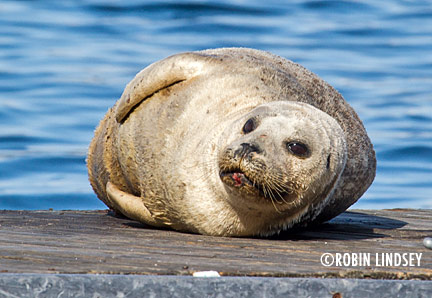 Around noon, the hotline received a call about a harbor seal “pup” at West Seattle’s busy boat ramp. It was, however, the same thin adult female who has been hauling out on the docks off and on over the past few days. Seal Sitters has been monitoring the health of this animal who has an infected wound on her mouth and appears to be battling some kind of respiratory issues. Her ragged fur indicates she is probably just about to begin a taxing molt of her coat to grow a new, sleek one before winter. During molts, seals spend more and more time resting out of the water and less time foraging.
Around noon, the hotline received a call about a harbor seal “pup” at West Seattle’s busy boat ramp. It was, however, the same thin adult female who has been hauling out on the docks off and on over the past few days. Seal Sitters has been monitoring the health of this animal who has an infected wound on her mouth and appears to be battling some kind of respiratory issues. Her ragged fur indicates she is probably just about to begin a taxing molt of her coat to grow a new, sleek one before winter. During molts, seals spend more and more time resting out of the water and less time foraging.
Launching and retrieving boaters have been very cooperative in letting her rest undisturbed. Nicknamed Jellybean, she is shown here enjoying the warm sun and checking out the boating activity on the opposite dock. In conversations with the fishermen, we have learned that fish stocks seem to be pretty bleak right now. The few fish that are being caught have empty bellies - with none of the bait or “forage” fish that harbor seal pups in particular favor. However, coho salmon which are returning to spawn do not usually forage on their journey, so an empty stomach would not necessarily indicate a lack of bait fish. But fishermen do report that there have not been many herring balls in our area - perhaps the underlying reason we are seeing so many struggling and terribly thin pups again this year - and higher than normal mortality rates for West Seattle.
Jellybean returned to Elliott Bay about 6:30pm and several pups were observed swimming nearby in the pastel blue and pink water. Perhaps one of those pups was the same one who unsuccessfully tried to haul out on the dock next to Jellybean the day before. Volunteers lingered to make sure the adult didn’t return. As the sun dipped behind Admiral hill, California sea lions cruised by close to shore against a backdrop of Seattle’s shimmering gold skyline - a stunning Pacific Northwest evening.
Very late in the afternoon, we responded to a report of a yet another seal pup resting on a beach on the west side. The small, cholcoate-colored pup was protected by volunteers until dark when the high tide crept in to close off access.
Thanks to our first responders and the many volunteers who enjoyed a day of sunshine, laughter and camaraderie, learning and, most importantly, the satisfaction of knowing they helped animals in need.

Launching and retrieving boaters have been very cooperative in letting her rest undisturbed. Nicknamed Jellybean, she is shown here enjoying the warm sun and checking out the boating activity on the opposite dock. In conversations with the fishermen, we have learned that fish stocks seem to be pretty bleak right now. The few fish that are being caught have empty bellies - with none of the bait or “forage” fish that harbor seal pups in particular favor. However, coho salmon which are returning to spawn do not usually forage on their journey, so an empty stomach would not necessarily indicate a lack of bait fish. But fishermen do report that there have not been many herring balls in our area - perhaps the underlying reason we are seeing so many struggling and terribly thin pups again this year - and higher than normal mortality rates for West Seattle.
Jellybean returned to Elliott Bay about 6:30pm and several pups were observed swimming nearby in the pastel blue and pink water. Perhaps one of those pups was the same one who unsuccessfully tried to haul out on the dock next to Jellybean the day before. Volunteers lingered to make sure the adult didn’t return. As the sun dipped behind Admiral hill, California sea lions cruised by close to shore against a backdrop of Seattle’s shimmering gold skyline - a stunning Pacific Northwest evening.
Very late in the afternoon, we responded to a report of a yet another seal pup resting on a beach on the west side. The small, cholcoate-colored pup was protected by volunteers until dark when the high tide crept in to close off access.
Thanks to our first responders and the many volunteers who enjoyed a day of sunshine, laughter and camaraderie, learning and, most importantly, the satisfaction of knowing they helped animals in need.







